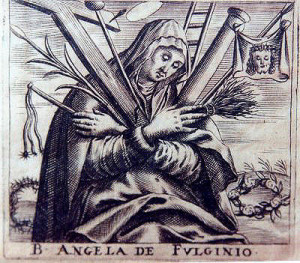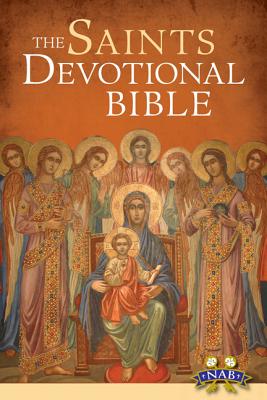Today we continue our regular series called “Learning from the Saints.” Our guide is expert Bert Ghezzi, a dear friend of mine and the author of numerous books including Voices of the Saints, Saints at Heart, and Discover Christ: Developing a Personal Relationship with Jesus.
His newest book is The Saints Devotional Bible, which illuminates the Scriptures with the saints’ own reflections. You can learn more about Bert and his work at BertGhezzi.com.
Today, Bert profiles St. Angela of Foligno, a patron of widows and those afflicted with sexual temptations. Pope Francis named Angela a saint by “equivalent canonization” in October 2013. She had been beatified in 1701, but her canonization had not been advanced. When we see Angela’s divesting herself of possessions, her service of the poor, and her dedication to prayer, we understand why Pope Francis used equivalent canonization to waive the usual judicial process and declare her a saint for the universal church.
Blessed Angela of Foligno is a model for people who want to simplify their lifestyle. As a young adult she reveled in luxury and sensuality. She married a rich man and used his wealth to indulge herself in possessions. And her impetuous temperament nudged her into sinful behavior.
 However, in 1285 Angela made a surprising about-face. One day she wept bitterly and confessed a serious sin to a friar, who absolved her. Then she embarked on a life of prayer and penance. Over the next six years, step-by-step she divested herself of her attachments to people and things.
However, in 1285 Angela made a surprising about-face. One day she wept bitterly and confessed a serious sin to a friar, who absolved her. Then she embarked on a life of prayer and penance. Over the next six years, step-by-step she divested herself of her attachments to people and things.
In 1288, her mother, husband and sons died of a plague. As a widow, Angela was free to concentrate on her pursuit of holiness. She modeled herself on St. Francis of Assisi and joined the Franciscan Third Order in 1291.
Like Francis, Angela expected to meet Christ in the poor. For instance, on Holy Thursday, 1292, she and a companion went to care for lepers at he hospital in Foligno. After they had washed a man who was badly decomposed, they drank some of the bath water. The experience so moved Angela that she says all the way home she felt “as if we had received Holy Communion.”
Angela of Foligno was a visionary who, like St. Catherine of Siena, at the drop of a hat might fall into a trance. From 1292 to 1296, she dictated her revelations to Brother Arnold, her confessor. Angela recorded thirty steps of her tortured spiritual journey, which always seemed to blend awareness and absence of God, certitude and doubt, and joy and agony.
A small band of disciples gathered around the saint. She led them wisely, instructing them in basic Christian living. This excerpt from her Instructions advocates prayer and meditation on Scripture:
“No one can be saved without divine light. Divine light causes us to begin and to make progress, and it leads us to the summit of perfection. Therefore if you want to begin and to receive this divine light, pray. If you have begun to make progress, pray. And if you have reached the summit of perfection, and want to be super-illumined so as to remain in that state, pray.
If you want faith, pray. If you want hope, pray. If you want charity, pray. If you want poverty, pray. If you want obedience, pray. If you want chastity, pray. If you want humility, pray. If you want meekness, pray. If you want fortitude, pray. If you want any virtue, pray.
And pray in this fashion: always reading the Book of Life, that is, the life of the God-man, Jesus Christ, whose life consisted of poverty, pain, contempt and true obedience.”
At Christmas, 1308, Angela told her companions she would die shortly. A few days later Christ appeared to her, promising to come personally to take her to heaven. She died in her sleep on January 3, 1309.
“I was inspired with the thought that if I wanted to go to the cross, I would need to strip myself in order to be lighter and go naked to it. This would entail forgiving all who had offended me, stripping myself of everything worldly, of all attachments to men and women, of my friends and relatives, and everyone else, and likewise, of my possessions and of my very self. Then I would be free to give my heart to Christ from whom I had received so many graces, and to walk along the thorny path, that is, the path of tribulation.”
— Angela of Foligno
(Image Credit: Wikimedia)
Read more from Bert at his website www.BertGhezzi.com, or check out his many books on Amazon.
 |
 |
 |
 |


